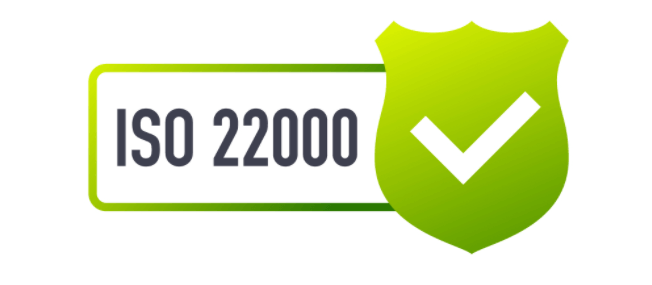What is ISO 22000 Food Safety Management System?
ISO 22000:2018 specifies requirements for a food safety management system (FSMS) to enable an organization that is directly or indirectly involved in the food chain:
- Plan, Implement, Operate, Maintain, and Update an FSMS providing safe products and services.
- Demonstrate compliance with applicable statutory and regulatory food safety requirements.
- Evaluate and assess mutually agreed customer food safety requirements and demonstrate conformity with them.
- Effectively communicate food safety issues to interested parties within the food chain.
- Ensure that the organization conforms to its stated food safety policy.
- Demonstrate conformity to relevant interested parties.
- Seek certification or registration of its FSMS by an external organization, or make a self-assessment or self-declaration of conformity to its document.
Quick Navigation
What is ISO 22000 Certification?
ISO 22000 Certification is a management system standard that provides a framework to ensure the safe operation of food businesses. It is an International Standard designed to guarantee a secure food supply chain of the world’s scale.

The ISO 22000 international standard specifies the requirements for a food safety management system that involves the following elements:
The most effective food safety systems are established, operated, and updated within the framework of a structured management system and incorporated into the overall management activities of the organization. It provides maximum benefit for the organization and interested parties.
- ISO 22000 has been aligned with ISO 9001 to enhance the compatibility of the two standards.
- The standard integrates the principles of the Hazard Analysis and Critical Control Point System and application steps.
- This standard requires all hazards that may occur in the food chain, including risks associated with the type of process and facilities used, are identified and assessed.
- Thus it provides the means to determine and document why specific identified hazards need to be controlled by a particular organization and why others need not.
What are the benefits of ISO 22000?
Some Senior Managers can see certification as an unnecessary and bureaucratic activity. For this reason, Senior Management needs to understand the benefits:
- A Food Safety Management System structured with HACCP principles will clearly focus on food safety, which is a fundamental requirement of any food business. An effectively implemented and applied HACCP-based Food Safety Management System will improve customer confidence in food protection.
- A Food Safety Management System based on HACCP takes a preventative approach to reduce liabilities.
- An effective Food Safety Management System demonstrates management commitment to the supply of safe products.
- Its records provide evidence of due diligence HACCP-based can combine food safety management systems with other management systems such as ISO 9001:2015. This combination offers a Food Safety based system that also considers quality.
- It gives all interested parties a clear message that the organization is serious about food safety.

To ensure a Food Safety Management System is effectively implemented, management within an organization needs to understand:
- The benefits of a Food Safety Management System
- How lack of an effective FSMS can cause borne illness.
- A HACCP-based Food Safety Management System is a minimal system to ensure maximum control.
- Introduce internationally recognized processes to your business.
- Give suppliers and stakeholders confidence in your hazard controls.
- Put these hazard controls in place across your supply chain.
What are ISO 22000 Requirements?
The ISO 22000 standard contains the specific requirements to be addressed by the Food Safety Management System. This standard requires ISO 22000 processes, including:
- Planning and designing a management system and documenting the system.
- Maintaining records of the performance of the system.
- Establishing a group of qualified individuals to make up a Food Safety Team.
- Defining communication procedures to ensure effective communication with important contacts outside the company and effective internal communication.
- Providing adequate resources for the effective operation of the FSMS, including appropriately trained and qualified personnel, sufficient infrastructure, and an appropriate work environment to ensure food safety.
- Implementing Prerequisite Programs.
- Following HACCP Principles.
- Establishing a traceability system for the identification of products.
- Establishing a corrective action system and control of nonconforming products.
- Maintaining a documented procedure for handling withdrawal of the product.
- Controlling monitoring and measuring devices.
- Establishing and maintaining an internal audit program.
What is ISO 22000 Certification Process?
If your company is looking for an ISO 22000 Certification in Food Safety management system (FSMS) based standard, you might be overwhelmed with figuring out where to start. To help with this, here are the steps needed to help you make sure that nothing is missed during your implementation and preparations for certification.
- Management Support
- Establish Certification Project, Project Plan, and Resources
- Conduct Awareness Training
- Identify the Implementation Team
- Conduct Implementation Training
- Define Context, Scope, and Policy
- Define Risk Assessment and Risk Treatment, Objectives, Processes and Procedures
- Implement ISO 22000 Processes and Procedures
- Conduct Internal Auditor Training
- Conduct Internal Audits
- Closure Activities and Corrective Action Reports
- Conduct Management Reviews
- Gap Analysis
- Choose a Certification Body
- Operate and Measure the FSMS
- Certification Audit-Stage 1
- Certification Audit-Stage 2
ISO 22000 Certification in Pakistan
ISO 22000 Certification in Pakistan combines and also supplements the core components of ISO 9001 and HACCP to provide a reliable framework for the development, implementation, monetarization, and regular improvement of a recorded Food Safety and Security Management System (FSMS) within the context of the company’s total service hazards.
This ISO Certification is planned for companies looking to establish a more focused, systematic, and incorporated FSMS than is typically required by regulation. The standard calls for meeting any appropriate food safety and security-related legal and regulative requirements right into its food safety and security system

These are a couple of fundamental reasons that one must apply ISO 22000 Certification standards:
- Six hundred million individuals worldwide fail ill because of the communication of food.
- It causes a rise in fatality rates; approximately 420,000 people pass away annually.
- Amongst the case of people, 30% are kids aged five years.
There are numerous benefits of ISO 22000 Certification for the companies associated with the food cycle in Pakistan:
- Getting certified with this Certification in Pakistan has enhanced the revenues for food sectors throughout the regions.
- The Certification guarantees that the organization examines the procedure needed to provide safe food to the end-user.
- This certification increases the organization’s understanding of possible food hazards.
- It additionally makes sure the organization eagerly anticipates lasting food safety and security.
- It improves the organization’s ability to offer and provide food worldwide.
- Organizations can enhance the techniques to manage food safety risks.
- ISO 22000 Certification in Pakistan boosts the trust fund between the supply chain, stakeholders, and end-users.
What is ISO 22000 Certification Cost?
Various factors determine the ISO 22000 Certification cost in Pakistan. ISO 22000 is a popular food certification in Pakistan. The cost is calculated considering the audit time requirement, no. of people trained, the geographic location from which the organization operates, etc.
Why Choose Us?
TUV Austria Bureau of Inspection & Certification is one of Pakistan’s top leading ISO Certification companies. We supply the most effective ISO Certification Auditors with the solution of Application, Documentation, Certification, Audit, and other relevant solutions at an affordable price throughout the world. In Addition, to ISO 22000 service, we also offer a range of complimentary services:
- ISO 9001 – Quality Management System
- ISO 14001 – Environmental Management System
- ISO 45001 – Occupational Health & Safety Management System
- ISO 55001 – Asset Management — Management Systems Requirements
- ISO 27001 – Information Security Management System
- ISO 20000 – IT Service Management System
- HACCP – Food Safety Management System
- Halal Certification
- ISO 21001 – Educational Organizations Management System
- ISO 29990 – Learning Services Management System
- ISO 20121 – Sustainability Event Management System
- ISO 22301 – Business Continuity Management System
- ISO 37001 – Anti-Bribery Management System
- ISO 28000 – Supply Chain Security Management System
- ISO 13485 – Quality Management Systems for Medical Devices
- ISO 39001 – Road Traffic Safety Management System
- ISO 31000 – Risk Management – Guidelines
- ISO 22716 – Good Manufacturing Practices for Cosmetics
FAQS
What is ISO 22000?
ISO 22000 Certification, among the ISO-specific standard, is a prerequisite for a food security and administration program applicable throughout the whole food supply chain. It is an effective advertising tool that demonstrates food security and top quality.
What is the difference between FSSC 22000 and ISO 22000?
ISO 22000
- This standard applies to all stages of the supply chain
- It is aligned with ISO 9001 to enhance compatibility with the existing management system.
FSSC 22000
- FSSC 22000 Applies to Food Manufacturers.
- It Contains the requirements of ISO 22000 and the ISO/TS 22002-1, or ISO/TS 22002-4.